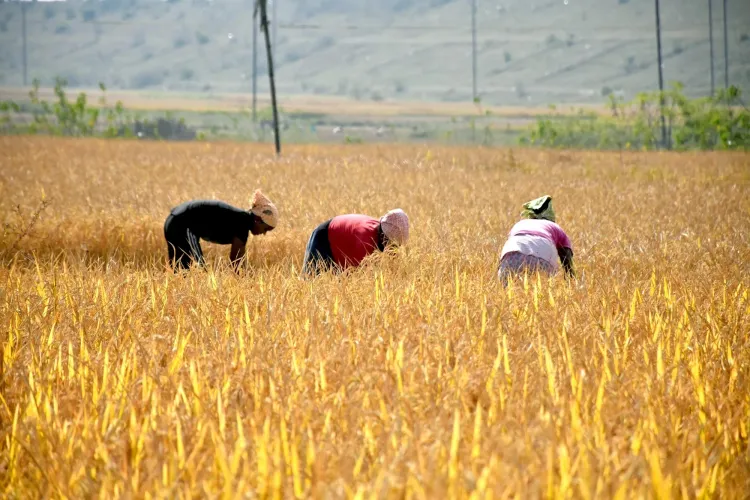Why Are Farmers in the Delta Struggling with Kuruvai Paddy Procurement?

Synopsis
Key Takeaways
- Farmers are facing procurement delays due to poor planning.
- Thousands of tonnes of paddy are left unprocessed and exposed to rain.
- Gunny bag shortages are causing significant distress among farmers.
- Administrative issues within TNCSC are complicating procurement efforts.
- Immediate action is urgent to protect farmers' livelihoods.
Chennai, Oct 20 (NationPress) As the Kuruvai harvest reaches its conclusion, farmers throughout the Cauvery Delta are facing significant challenges in getting their paddy procured. The Tamil Nadu Civil Supplies Corporation (TNCSC) has shown deficiencies in planning and coordination.
Inadequate transportation, a lack of gunny bags, and the failure to hold pre-season discussions with farmers have resulted in thousands of tonnes of paddy accumulating outside Direct Procurement Centres (DPCs), vulnerable to the monsoon rains.
This year’s Kuruvai farming has been notably extensive, covering 6.31 lakh acres—an increase from the usual 3.87 lakh acres.
Although only 30 percent of the crop is yet to be harvested, procurement has lagged significantly. Of the 70 percent already collected, only 40 percent has been retrieved by the TNCSC, leading to extensive stockpiles at various centres.
Each DPC is estimated to hold between 10,000 and 20,000 chippoms (40-kg bags) of paddy, causing congestion and logistical obstacles. These delays are linked to administrative instability within TNCSC, which has seen five Managing Directors transferred between January and October this year.
The absence of strong leadership has hindered crucial decision-making during the peak procurement period, particularly in Thanjavur, Tiruvarur, Mayiladuthurai, and Nagapattinam districts—the core of the Delta region.
The gunny bag shortage has only heightened farmers’ distress. Despite official assertions that stocks are being replenished through new procurement from West Bengal, the reality remains bleak, with most DPCs reporting insufficient supply.
This shortage has impeded packing and dispatch operations, further delaying transportation to warehouses. In numerous areas, paddy is temporarily stored in open spaces as new DPCs have yet to become fully operational.
With limited lorries available for transport from DPCs to godowns, procurement staff have managed to retrieve only between 500 and 600 bags a day per centre, far short of the goal of 1,000 bags.
Ongoing rainfall across the Delta has exacerbated the crisis, with reports of paddy stocks sprouting at various centres due to extended exposure to moisture.
Farmers, weary from months of cultivation, are left anxious and frustrated, many spending days at DPCs waiting for procurement. They have urged the government to expedite procurement immediately after Deepavali to protect their hard-earned produce from further damage as the Northeast Monsoon intensifies.
aal/rad









